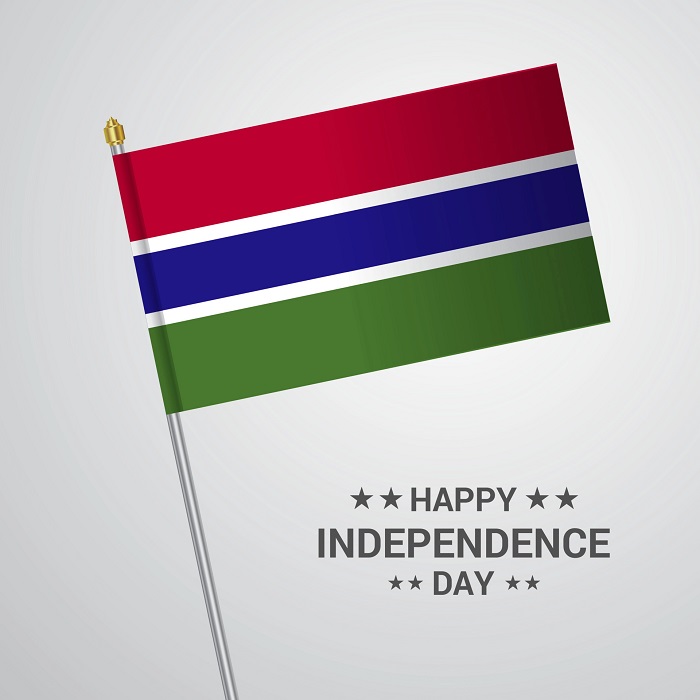Gambia Independence Day- February 18, 2023- Blogs Year

Gambia Independence Day is celebrated on February 18th every year to commemorate the country’s independence from British colonial rule in 1965. The Gambia is a small West African nation that was under British rule for over 300 years before it gained independence.
Also Read:- Cambodia Independence Day- Nov 9, 2023- Blogs Year
The anniversary of The Gambia’s emancipation from the British Empire is commemorated on February 18 with the celebration of Gambia Independence Day. On February 18, 1965, The Gambia finally attained the right to self-governance after decades of imperialism and exploitation. On this day, British colonialism in West Africa likewise comes to an end, and a new era for the subcontinent begins. The day is a federal holiday, and people all around the country celebrate. In McCarthy Square in Banjul, marches are organised, and public dignitaries salute the President there.
The Gambia Independence Day is a public holiday in the country, and it is celebrated with parades, cultural displays, and other festivities. The celebrations are held in the capital city of Banjul, and the country’s president typically gives a speech highlighting the country’s achievements and goals for the future.
The day is also an occasion for Gambians to reflect on their history, celebrate their culture, and renew their commitment to building a prosperous and peaceful nation. It is a day for national unity, and Gambians of all backgrounds come together to celebrate their shared identity and aspirations for the future.
History of Gambia Independence Day
The Gambia gained independence from British colonial rule on February 18, 1965. The country had been a British protectorate since the 19th century, and it was administered as part of the larger British colony of Senegal and Gambia until 1888, when it became a separate colony.
During the colonial era, the Gambia was a major center for the transatlantic slave trade, and its economy was dominated by the production of groundnuts (peanuts), which were cultivated by the local population under harsh conditions.
In the early 20th century, a movement for self-rule began to emerge in the Gambia, and in 1960, the country was granted self-government by the British. In 1963, the Gambia joined with Senegal to form the Federation of Mali, but the federation was short-lived, and the Gambia became an independent republic in 1965.
The Gambia’s first president was Sir Dawda Jawara, who led the country for over two decades until he was overthrown in a coup in 1994. Since then, the country has experienced periods of political instability, including a brief period of rule by the military, but it has also made significant progress in the areas of economic development, democracy, and human rights.
Today, the Gambia is a member of the United Nations, the African Union, and other international organizations, and it is a popular tourist destination known for its beautiful beaches, wildlife, and vibrant culture. The country continues to face significant challenges, including poverty, unemployment, and political instability, but it remains a proud and independent nation with a rich history and culture.
The Gambia is the smallest nation in Africa and home to a vibrant, multi-ethnic society. An average of four regional languages are spoken by every Gambian. The Gambians are renowned for their fortitude and other excellent traits. The people cooperate to earn a living wage and contribute to the prosperity of the nation despite severe political unrest and a stable economy.
Following Prince Henry the Navigator’s unintentional discovery of The Gambia in the 15th century, The Gambia attracted the interest of Europeans. A trade agreement between Portuguese travellers and the people of Cape Vert was quickly established. After making their way through River Gambia, visitors arrived in The Gambia at the stream’s mouth. The ship’s landing site was dubbed St. Andrew’s Island. The land has now been divided up among different inhabitants. Many nations, from the French to the English, occupied the island and seized its resources, particularly its gold. The British took complete control of the country in 1889 and ruled for more than 60 years.
All around the nation, independent politics grew, and in 1901, the movement for self-governance received widespread recognition. The Gambia soon after acquired its first legislative body and armed force. The Gambia received examples for local leadership from the council, which also empowered the young of the nation. On December 17, 1964, the newly established Gambian government and the British signed an accord of freedom, four years after the first federal elections. The Gambia was given complete independence in 1965 as a result of the passage of the Gambia Independence Act of 1964.
Gambia Independence Day FAQs
Here are some frequently asked questions about Gambia Independence Day:
- Why is February 18 celebrated as Gambia Independence Day?
February 18, 1965, is the day when the Gambia gained independence from British colonial rule. It is celebrated as the country’s Independence Day.
- What is the significance of Gambia Independence Day?
Gambia Independence Day is a day of national pride and celebration, commemorating the country’s freedom from colonial rule and the establishment of an independent republic.
- How is Gambia Independence Day celebrated?
Gambia Independence Day is celebrated with parades, cultural displays, speeches, and other festivities. The celebrations are held in the capital city of Banjul, and the country’s president typically gives a speech highlighting the country’s achievements and goals for the future.
- Is Gambia Independence Day a public holiday?
Yes, Gambia Independence Day is a public holiday in the Gambia, and all government offices, schools, and most businesses are closed on this day.
- What is the history of the Gambia’s struggle for independence?
The Gambia’s struggle for independence was part of a broader movement for decolonization in Africa. The country’s journey to independence was marked by a series of protests, strikes, and political negotiations, as well as the emergence of a strong nationalist movement.
- What are some of the challenges facing the Gambia today?
The Gambia continues to face significant challenges, including poverty, unemployment, and political instability. The country is also vulnerable to climate change, with rising sea levels and changing weather patterns affecting agriculture and tourism.
- What is the future of the Gambia?
Despite the challenges facing the country, the Gambia has made significant progress in the areas of economic development, democracy, and human rights. The country’s young and dynamic population, along with its rich natural and cultural resources, offer hope for a bright future.








